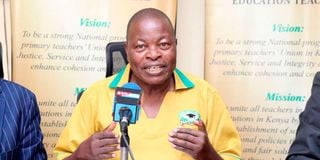Premium
Threat of strike looms as teachers’ unions, TSC talk

Kuppet Secretary-General Akello Misori.
The two gigantic teachers’ unions have engaged their employer in make-or-break talks to avert a potential strike that could cripple national examinations next month.
The Kenya Union of Post-Primary Education Teachers (Kuppet) and the Kenya National Union of Teachers (Knut) are in crucial negotiations with the Teachers Service Commission (TSC) over a new pay deal.
The three signed the 2021-2025 collective bargaining agreement (CBA) last year that gave no monetary benefits to members following the expiry of the previous one that was worth Sh54 billion.
The unions argue that the economy has now improved. In a January 17 letter to TSC, Kuppet demanded a pay rise of at least 30 per cent and threatened to call a strike if the commission did not respond within 21 days. They responded on January 20.
“The commission is interrogating the issues raised therein, we will respond thereafter,” Mr Cavin Anyuor, the legal, labour and industrial relations director at TSC, said in the letter to Kuppet Secretary-General Akelo Misori.
The Kenya Certificate of Primary Education is scheduled begin on March 7 and end on March 9 while the Kenya Certificate of Secondary Education will run from March 14 until April 1. Apart from supervision of the examinations, teachers are also involved in marking.
Negotiate CBA
Kuppet’s National Executive Committee (NEC) yesterday met in Nairobi. Mr Misori and national chair Omboko Milemba did not respond to our phone calls and text messages. Knut also seeks to renegotiate its CBA to introduce monetary benefits. They are pushing for a pay rise of between 15 and 20 per cent.
“There’s a lot of progress being made. We are doing well. Once we are there, we shall invite you and let you know,” said Knut secretary-general, Mr Collins Oyuu. “We are talking. Some of these things are political.”
The union is engaged in a campaign to bring back teachers who quit between 2019 and June last year when TSC had a sour relationship with the leadership of then Knut secretary-general Wilson Sossion.
Its membership shrunk from 187,000 to 15,000 and many were left out of salary increment and promotions. The monthly earnings from union dues dropped from Sh144 million to just Sh11 million. This saw union staff go without pay for months while debts accumulated.
In its proposal, Kuppet wants the basic monthly salary of the lowest paid teacher to be raised from Sh34,955 to Sh59,425 and that of the highest paid increased from Sh118,242 to Sh153,715. It also wants an increase in the commuter allowance from Sh5,000 to Sh8,500 for the lower cadre teachers and Sh16,000 to Sh20,000 for the highest paid tutors.
If their demands go through, Kuppet members who qualify for hardship allowance will see it increased from Sh10,900 to Sh16,350 for the lowest paid teacher and Sh38,100 to Sh57,150 for the top earners.
Kuppet has also proposed a new risk allowance for science teachers that it wants to range between Sh5,465 and Sh30,587.
Budget Policy Statement
However, an analysis of the 2022 Budget Policy Statement (BPS) for the education sector has not factored in an allocation for teachers’ pay rise.
The report, which has been presented to the Committee on Education and Research of the National Assembly by the Parliamentary Budget Office, shows TSC has planned to use its increased allocation of Sh15 billion to employ 13,000 secondary school teachers and 9,000 interns to cope with exits and the expected increase in enrolment when junior secondary is rolled out in January 2023.
This will be bad news for teachers who have been hoping that their employer might offer them a new CBA. The issue of renegotiating the CBA was not discussed when TSC boss Nancy Macharia appeared before the parliamentary committee last week to discuss their budget proposals.
She told MPs allocations for other critical areas like promotion of teachers on competitive selection, roll-out of a national biometric enrolment and validation of teachers and gratuity to 3,358 contract tutors in northern Kenya had not been factored in.
“The commission would appreciate [Parliament’s help] for these areas to receive some allocation,” she said.





